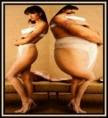Nowadays, a lot of pressure on young girls and women to look unrealistically perfect, like a Barbie doll or a super model.
Everywhere you're looking for, especially in magazines for young people to find grotesque images of thin women with pale skin and no emotion. For many of these people, for whatever reason, is what it means to himself beautiful.
When compared to these pictures, young girls are found inadequate. You can not see the outline of their rib cages in a bikini, they have a flat stomach instead of the subtle rolling toned abs, she weighs 120 instead of 115 or 115 instead of 110, and so is on.
This anorexia nervosa, a complex mix from psychological, biological and social factors that lead to unrealistic goals and a deadly perfectionism.
The only way to really combat anorexia nervosa is characterized by a change in the perception of beauty. Most of the girls who fall into the eating disorders are not obese or even overweight.
They do not need to lose weight and should not try it. Instead, these girls must change their attitudes by actively switching role until models.
The women, women of substance that caused many great intellectual achievements, and not those who all their lives striving for the perfect impossible body.
Girls suffering from anorexia nervosa, once come to the realization that they have the disease, say friends and family and seek the professional care of a doctor, they can ensure a healthy regime of nutritious food and cardio exercises remain fit.
They should also recognize that Beauty is not solely on the basis of outward appearance, but also actions and attitudes.
Article Source: http://EzineArticles.com/?expert=Amanda_Wright


